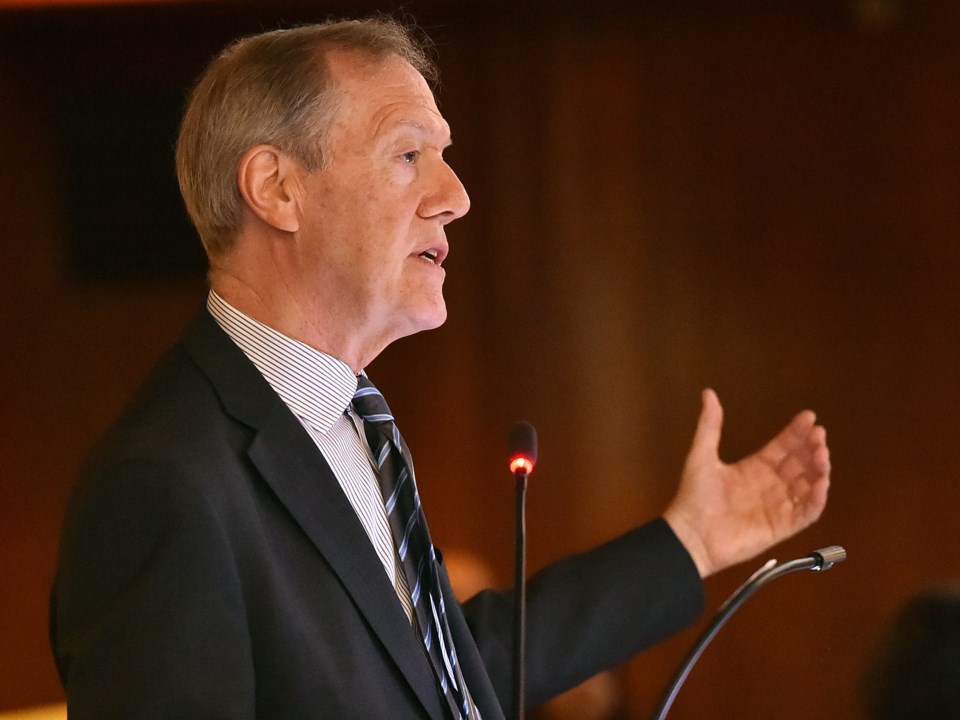The author of two reports that detailed the extent of money laundering in B.C. suggested to Vancouver council Tuesday the city consider creating an anti-money laundering committee to review its financial operations.
Dr. Peter German, a retired RCMP deputy commissioner, made the suggestion in response to questions from councillors on what more the city could do to combat money laundering.
“I suspect it’s probably of some value to the city to look at all of your financial operations and the different aspects of it — whether it is taxation, whether it is real estate — and to assess whether or not you’ve got appropriate anti-money laundering controls in place,” said German, standing at a lectern in the council chamber.
It was German’s first presentation to a city hall in B.C. since the provincial government released his “Dirty Money” reports and announced last week a public inquiry will be held into money laundering in B.C.
German emphasized to council he was stating his opinion on what action Vancouver could take to combat money laundering, and not speaking on behalf of the provincial government.
“I don’t think it would hurt to look at some form of an anti-laundering committee to look at the various aspects of your enterprise and say, ‘OK, have we got it covered off?’’’ he said.
“Your auditors or your accountants can do that to a certain extent. The police can do it. But it’s probably worth looking at some form of anti-money laundering committee or working group to take a look at the issue.”
Mayor Kennedy Stewart wouldn’t say whether he supports such a committee, pointing out Police Chief Adam Palmer was expected to deliver a report on money laundering at next month’s Vancouver Police Board meeting.
“Perhaps it’s better housed within the VPD, but I think we can have a discussion on that in the coming weeks to see how best we manage the administration of going forward with the [public] inquiry,” Stewart told reporters after German’s visit to city hall.
German’s first report in 2018 described a history of money laundering and criminal activity in Lower Mainland casinos. His follow-up report, released earlier this month, revealed thousands of properties worth billions as “high risk” for potential money laundering, tax evasion, or both.
The report looked at the link to money laundering in real estate, luxury cars and horse racing. German concluded there was no agency or police force with adequate oversight or resources to investigate these suspicious activities.
He made it clear to councillors that he was commissioned by the provincial government to produce the reports, and that the terms of reference for his work did not include reviewing municipal halls.
“I did not — nor did I really have time — to get into the municipal level,” he said, noting however that a tip line produced leads related to building, construction and permits. “It wasn’t directly in my mandate, so we didn’t go there.”
Added German: “I do think it’s probably somewhat virgin territory looking at this at a municipal level.”
German pointed out the City of Richmond passed a series of recommendations in February aimed at preventing money laundering in its city.
One of the actions was to include criminal record checks and other regulations for operators of money exchange businesses.
Richmond also called for legislative reforms that will “create transparency around beneficial ownership of corporations and land” and to have the B.C. Lottery Corporation place limits on casino purchases.
Requesting Canadian banks be required to ensure the name of the remitter be identified on all bank drafts was another request, which came after Richmond city staff and the Richmond RCMP prepared a report on money laundering for that municipality’s council.
In January, the City of Vancouver announced it would no longer accept cash payments of more than $10,000 from people paying bills in an effort to prevent or deter potential money laundering.
The city received 19 cash payments last year exceeding $10,000.
The city didn’t say what the payments were related to, although the city collected $13 million in cash last year for services such as parking permits, bylaw fines, business licences, municipal taxes and taxes collected on behalf of other authorities.
NPA Coun. Melissa De Genova told council in January that she had seen, on two separate occasions, people with bags of money in city hall. Green Party Coun. Adriane Carr said she had people report to her that they've seen people bring a suitcase into city hall to pay taxes.
@Howellings



